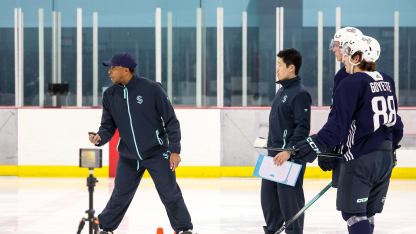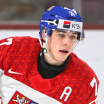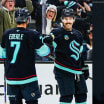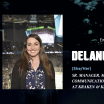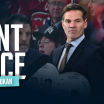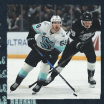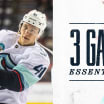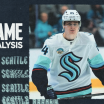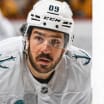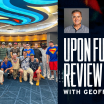Communication continued between Childs and the Kraken throughout the year, and Kraken voices were some of the ones that offered letters of recommendation in advance of Childs being named head coach of the Omaha Lancers (USHL).
This summer Childs was again part of the Kraken’s development camp. He says after learning a lot about systems last year, this year’s camp added an understanding of organization behind the scenes and how to bring young players into a team – tools the new head coach is already planning to use in Omaha.
“I'm a testament of being a product of this environment, right?” Childs said. “I totally believe that being in Seattle and seeing how things work and building those relationships helped me gain confidence and (learn) new aspects of the game that allowed me to reach the next level. I think it's unbelievable to be able to come in and see how things are done at the highest level of your profession….it's been a defining moment in my career the last now two years being able to be around one NHL organization but just a special one with the people.”
Childs wasn’t the only participant in the mentorship program this year. A familiar face at Kraken Community Iceplex (KCI), David Kyu-Ho Min who serves as a player development coach and head coach for the AAA 16U junior Kraken team, was also in and around all camp activities.
Hockey has been a way for Min to connect with a new home and friends after his family came to North America from Seoul, Korea when he was a child. Knowing what hockey did for him, Min grew a passion and skill for “player-centered coaching.”
When Min got the call from the NHLCA about participating in the mentorship, he jumped at the opportunity. Development camp was his first official event as part of the program.
“(The mentorship) is a great resource to develop the coaching side of things but also opens up new opportunities and new doors,” Min said. ”This week is a great example and it’s helping my personal development and experience coaching.”
Like Childs, Min soaked up the opportunity to see how things operate “inside the room” – how staff interacts at an NHL level; what organization goes into running a practice or a camp. But he was most invigorated by “the energy and the dynamics of all the smart hockey minds” he was working with as part of the coaching staff.
When asked what his coaching aspirations might look like, true to his commitment to development, Min said he connected with the work of Kraken skills coach Matt Larke – who regularly worked on the fundamentals of the game with Seattle prospects throughout camp.
“I love being on the ice, right?” Min said. “So, seeing what (Larke) brings to the table for the team and seeing his skill set…it's pretty unbelievable. Being in that sort of role seems very, very exciting for me.
“But at the moment, all I care about is how can I improve the development and growth of the game from a youth perspective ...that could be at the grassroots level, it could be at the triple A level, it could also be trying to help foster the high-end players that come back for the summer time at the elite level of junior and college and some of the other pro guys that come back.”
Supporting that diversity of coaching focus, as well as diversity in terms of who is part of a coaching staff overall, has been a hallmark of what the Kraken are trying to accomplish – not just through the coaching mentorship program, but in any opportunity to “grow the game.”
“I think across the League and even amongst other sports, I think the Seattle Kraken has made a very positive reputation of changing the game, providing opportunity and breaking barriers,” Min said. “I'm firsthand experiencing that. I have nothing but great things to say about the degree of opportunity and the openness this organization has.”

